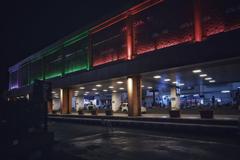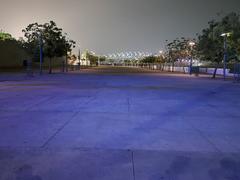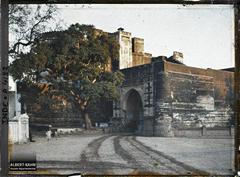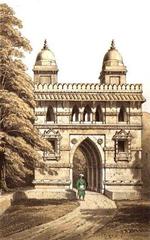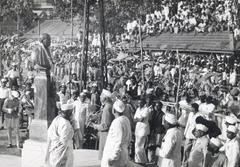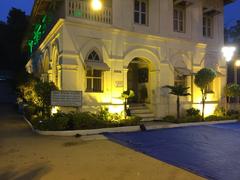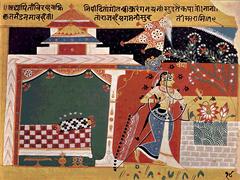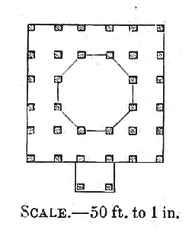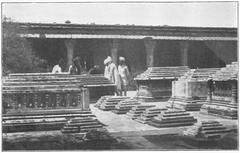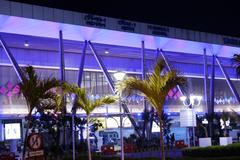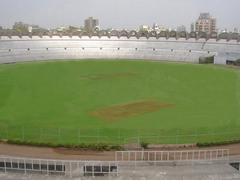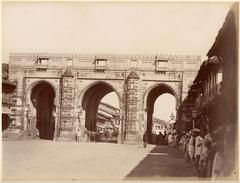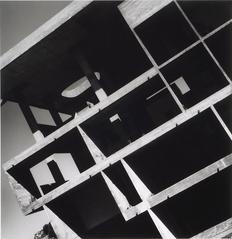Villa Sarabhai Ahmedabad: Visiting Hours, Tickets, and Historical Significance
Date: 15/06/2025
Introduction
Villa Sarabhai is an architectural icon in Ahmedabad, India, representing the confluence of global modernism and Indian tradition. Conceived by Le Corbusier and commissioned by Manorama Sarabhai in the early 1950s, the villa stands as a testament to visionary patronage and architectural brilliance. This comprehensive guide delves into the villa’s historical background, architectural significance, and practical visitor information—including visiting hours, ticketing, accessibility, and travel tips—to help you experience one of Ahmedabad’s most celebrated historical sites (Fondation Le Corbusier; Apollo Magazine).
Historical Context and Cultural Significance
Ahmedabad in the 1950s
In the post-independence era, Ahmedabad was emerging as a center of economic prosperity and cultural innovation. Known as the “Manchester of India” for its thriving textile industry, the city fostered a progressive environment where influential families, such as the Sarabhais, played a pivotal role in shaping its identity and architectural landscape (Apollo Magazine).
The Sarabhai Family as Cultural Patrons
The Sarabhai family, renowned industrialists and philanthropists, were instrumental in introducing modernist ideas to India. Manorama Sarabhai and her siblings, including Gira Sarabhai, not only supported the arts and architecture but also established significant cultural institutions, such as the Calico Museum of Textiles. Their commitment to cultural advancement provided the foundation for commissioning Le Corbusier to design Villa Sarabhai, with an emphasis on integrating local values and environmental sensitivity (Fondation Le Corbusier).
Commissioning Le Corbusier
The decision to engage Le Corbusier reflected the Sarabhais’ aspiration to blend cutting-edge design with Indian traditions. The villa was part of a larger wave of modernist projects in Ahmedabad, including the Mill Owners’ Association Building and Shodhan House, reinforcing the city’s status as a hub for international architectural innovation (Archeyes).
Architectural Highlights
Contextual Modernism
Villa Sarabhai exemplifies Le Corbusier’s ability to adapt modernist principles to the Indian context. Its passive cooling strategies—vaulted roofs, brise-soleil, and open spatial arrangements—respond directly to Ahmedabad’s hot and humid climate (Archeyes; Architectural Digest).
Design Features
- Vaulted Roofs: Iconic parabolic vaults provide natural insulation and dramatic interiors.
- Open Plan: Flexible living spaces encourage fluid movement and social interaction.
- Material Palette: Exposed brick, concrete, and teak wood reflect both modernist aesthetics and regional craftsmanship.
- Indoor-Outdoor Integration: Expansive verandas and large windows blur the boundaries between the villa and its 20-acre landscaped estate, embracing Jain values of harmony with nature.
- Catalonian Vaults: Shallow brick vaults supported by concrete beams enhance ventilation and thermal comfort (Visual Lexicon).
Living Cultural Artifact
Villa Sarabhai remains a private residence, symbolizing the enduring legacy of the Sarabhai family and Le Corbusier’s influence on Indian modernism. It continues to serve as a site of artistic and intellectual exchange, preserving its original spirit (SOS Brutalism).
Visitor Information
Visiting Hours
- By Appointment Only: Villa Sarabhai is a private residence. Visits require advance booking through the Sarabhai Foundation or the villa’s administrative office.
- Typical Hours: Guided tours are offered between 10:00 AM and 5:00 PM, subject to confirmation and resident schedules.
- Closed: No walk-in visitors or unconfirmed entries are permitted.
Tickets and Booking
- Fees: Visits are generally free, though some special events or group tours may involve a nominal fee.
- How to Book: Contact the Sarabhai Foundation, Calico Museum of Textiles, or recognized heritage tour operators to arrange your visit.
Accessibility
- Mobility: The villa’s historic design includes steps and uneven surfaces. Limited wheelchair access is available; inquire in advance for specific needs.
- Facilities: Restrooms are provided; there are no cafés or shops on site.
Guided Tours and Special Events
- Guided Tours: Mandatory for all visitors. Tours are led by experts in architecture or cultural heritage and last 45–90 minutes.
- Special Events: Occasional cultural or academic events are held in partnership with local organizations; check for upcoming programs in advance.
Photography and Etiquette
- Photography: Permitted in outdoor areas and select interiors with prior permission; flash and tripods are prohibited.
- Dress Code: Modest attire and comfortable walking shoes are recommended.
- Conduct: Respect the privacy of residents and follow your guide’s instructions throughout the visit.
Getting There and Nearby Attractions
- Location: Shahibaug, Ahmedabad—about 8 km from the city center and 10 km from Sardar Vallabhbhai Patel International Airport.
- Transport: Reachable by taxi, auto-rickshaw, or private vehicle. Rideshare services are convenient.
- Nearby Sites: Enhance your itinerary by visiting the Calico Museum of Textiles, Sabarmati Ashram, and Sanskar Kendra (also designed by Le Corbusier) (Holidify).
Practical Tips for Visitors
- Advance Booking: Essential due to the villa’s private status.
- Group Size: Typically limited to 5–15 people per tour.
- Identification: Bring a government-issued photo ID.
- Essentials: Carry water, sun protection, and a notebook for sketching or notes.
- Best Season: October to March offers the most comfortable weather for exploration.
Frequently Asked Questions (FAQs)
Q: Can I visit Villa Sarabhai without a guide?
A: No. All visits are guided to ensure preservation and provide context.
Q: Is there an entry fee?
A: Visits are free, but donations or nominal fees may apply for special events.
Q: Is Villa Sarabhai wheelchair accessible?
A: Accessibility is limited. Contact in advance to discuss specific needs.
Q: How can I book a visit?
A: Arrange appointments through the Sarabhai Foundation or Calico Museum of Textiles.
Q: Can I take photographs?
A: Yes, in designated areas and with permission.
Q: Are restrooms available?
A: Yes, but there are no cafés or shops on site.
Summary and Travel Recommendations
Villa Sarabhai is a unique testament to the synergy between local tradition and modernist innovation. It not only reveals Le Corbusier’s architectural mastery but also the Sarabhai family’s enduring cultural vision. Visiting the villa offers a rare opportunity to experience an active living heritage site, inspiring for both architecture enthusiasts and cultural travelers. Advance planning, respect for the site’s private status, and participation in guided tours will ensure a meaningful and memorable visit.
To expand your experience, explore nearby historical sites and immerse yourself in Ahmedabad’s vibrant architectural landscape. Stay informed about new developments, special events, and visitor tips via the Audiala app and relevant heritage platforms.
References and Official Links
- (Fondation Le Corbusier)
- (Apollo Magazine)
- (Archeyes)
- (Architectural Digest)
- (SOS Brutalism)
- (Holidify)
- (Calico Museum of Textiles)
- (TripAdvisor Villa Sarabhai Reviews)
